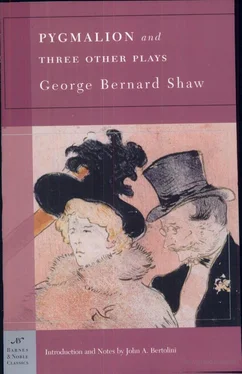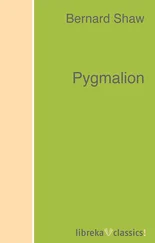Collection of essays published in 1902.
Reference to Back to Methuselah (1921), a cycle of five plays by Shaw that revisit the themes of evolution and human destiny.
Composers of symphonic poems, such as Nikolay Rimsky-Korsakov (1844-1908).
Like the English poet Percy Bysshe Shelley (1792 — 1822), Shaw was a vegetarian.
Gum disease.
Opening from the stomach into the intestine.
Eponymous hero of Henrik Ibsen’s Faustian verse drama of 1867.
Abnormal physical or emotional sensitivity.
As a warning to others; literally, “to encourage others” (French).
Socialist leader Jean Jaures, who defended Alfred Dreyfus (accused of treason), was assassinated by a fanatical patriot on July 13, 1914.
Georges Clemenceau (1841-1929) served twice as premier of France.
James Keir Hardie (1856-1915), first leader of the Labour Party in Parliament.
That’s war (French).
Russian-style (French).
Ideally.
Shaw uses the third-century B.C. Greek geometrician and engineer to symbolize reason.
Carmagnoles are songs and dances popular during the French Revolution; cor roberries (usually “corroborees”) are Australian Aborigine festivities with songs and dances.
Near quotation of Marc Antony in Shakespeare’s Julius Caesar (act 3, scene 1).
Allusion to the Bible, Ezekiel 18:2.
Military drill in which soldiers arrange themselves into files four deep.
Promising young intellectual and Fabian socialist who was killed in 1916.
Brutal criminal in Charles Dickens’s novel Oliver Twist (1837-1838).
The manager is American theatrical producer Charles Frohman (1860-1915); the author is Charles Klein, who co-wrote the 1910 farce Potash and Perlmutter.
Irish art dealer (1875-1915); director of the National Gallery of Ireland.
Paraphrase of a line in President Woodrow Wilson’s April 2, 1917, address to Congress upon the United States entering World War I.
Isabella makes this comparison in Shakespeare’s Measure for Measure (act 2, scene 2).
Quotation of more of Isabella’s speech.
Reference to the French traitor Paul Bolo, who was accused of spying on his country and executed in 1918.
Explosives used to breach a gate or wall.
All of these are allegorical places or persons in John Bunyan’s Pilgram’s Progress (1678), which Shaw admired for its hopefulness.
This commander in chief of the British forces (1914 — 1921) provided Shaw with a demonstration of experimental weapons.
Marietta Alboni (1823 — 1894), Italian contralto opera singer.
George Barnwell is a sinner in George Lillo’s middle-class sentimental tragedy The London Merchant (1731); Maria Martin is the heroine of Maria Martin, or the Red Barn Mystery, about her murder by her lover in 1827; Sweeney Todd is the legendary “Demon Barber” of London, who slit his customers’ throats.
Actor-manager of the period (1837-1919).
French farce adapted into English by James Alberry (1838-1899).
Reference to Sir Carl Meyer, who donated £70,000 to the National Theatre in 1908.
In the person of King Edward VII, who attended Shaw’s play John Bull’s Other Island (1904).
J. M. Barrie (see footnote to page 320) and Shaw, who were neighbors and friends.
Cathedral.
Music-hall turn by the animal imitators the Brothers Griffiths that parodied the French tightrope walker Charles Blondin (1824 — 1897).
The decor of the Adelphi Theatre was by Scottish architect Robert Adam (1728-1792).
Play by French dramatist Eugene Brieux, adapted into English in 1914 as Damaged Goods, by John Pollock.
Reference to English theater manager A. E. F. Horniman (1860-1937), who presented Shaw’s first publicly produced play, Arms and the Man, in 1894.
Allusion to the Bible, 2 Peter 2:22.
Quotation from the Emancipation Proclamation, issued by United States President Abraham Lincoln on January I, 1863.
Ironic allusion to the Bible, Isaiah 57:15.
In Shakespeare’s Macbeth (act 4, scene 1), when shown the descendants of the murdered Banquo in a vision, Macbeth asks if their line will “stretch out to the crack of doom?”
The explosive TNT.
Balcony-like platform projecting from the stern of a ship.
Usually spelled “centerbit”; tool for making cylindrical holes.
T squares, straightedges, and set squares are types of rulers.
Movable table legs that support table leaves.
Scrubbed with a piece of sandstone, as a ship’s deck.
New Temple Shakespeare was a popular series of Shakespeare’s plays.
Naval officer’s double-breasted blue jacket.
Idiosyncratic form of address (perhaps related to “dote”).
Dealer in supplies for ships.
Stale.
Hired transportation to and from the train station.
Simile taken from the Bible, Song of Solomon 7:4.
Velvety fabric.
Giuseppe Mazzini (1805-1872), an Italian revolutionary who sought to unify Italy under a republican government and who participated in Italy’s struggle for independence from Austrian domination.
That is, from bankruptcy, so he could once again engage in business.
Louis de Rougemont is the assumed name of nineteenth-century Swiss adventurer Louis Grin (1847- 1921), who wrote sensational, often bogus, accounts of his adventures; Hesione implies that “Marcus Darnley” (her husband’s pseudonym) is a liar.
Awards, named for Prince Albert (1819-1861, husband of Queen Victoria), for altruistic rescues from injury or death.
Saindy sage.
Читать дальше












